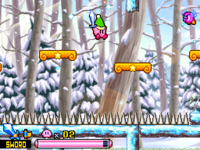Ice Island (theme): Difference between revisions
ShadowKirby (talk | contribs) m (→Composition: clarification) |
m (Track number) |
||
| (3 intermediate revisions by 2 users not shown) | |||
| Line 1: | Line 1: | ||
{{Infobox-Music | {{Infobox-Music | ||
|title=Ice Island | |||
|track=[[File:KSqS Snow Area.mp3]] | |track=[[File:KSqS Snow Area.mp3]] | ||
|caption=Sample of '''" | |caption=Sample of '''"Ice Island"''' from ''[[Kirby: Squeak Squad]]''. | ||
|game1=''[[Kirby: Squeak Squad]]'' (2006) | |game1=''[[Kirby: Squeak Squad]]'' (2006) | ||
|composer=[[Jun Ishikawa]], [[Hirokazu Ando]], [[Tadashi Ikegami]], or [[Shogo Sakai]] | |composer=[[Jun Ishikawa]], [[Hirokazu Ando]], [[Tadashi Ikegami]], or [[Shogo Sakai]] | ||
}} | }} | ||
'''" | '''"Ice Island"'''{{title}} is a theme from ''[[Kirby: Squeak Squad]]'' that plays in [[Ice Island - Stage 2]]. It can also be found in the [[Jukebox#Kirby: Squeak Squad|Sound Room]] as track 10. | ||
==Composition== | ==Composition== | ||
[[File:KSqS Ice Island - Stage 2.png|thumb|200px|left|Kirby navigates the snowy area.]] | [[File:KSqS Ice Island - Stage 2.png|thumb|200px|left|Kirby navigates the snowy area.]] | ||
" | "Ice Island" is a calm yet poignant theme in C major and 4/4. It starts off with a simple C-G-C accompaniment, as well as a rhythmically loose clarinet double dominant solo that immediately showcases the music's tonal instability. The string melody features a rising sequence of falling major triads, played twice. The first time it soon returns to its original height, while the second features a faint counterpoint in the likes of the intro, and the melody reaches G major. The nostalgic second section features a desending G minor scale-like synth passage similar to the fourth section of "[[Prism Plains (theme)|Prism Plains]]". In its development it briefly reaches back up before ultimately descending to D minor. The development continues with frequent modulations before winding up at a prolonged dominant to C major. The track loops from the first section. | ||
{{Navbox-KSqS Music}} | {{Navbox-KSqS Music}} | ||
[[Category:Music in Kirby: Squeak Squad]] | [[Category:Music in Kirby: Squeak Squad]] | ||
Latest revision as of 14:56, 23 April 2024
| ||||||||||
|
| ||||||||||
"Ice Island"[conjectural title] is a theme from Kirby: Squeak Squad that plays in Ice Island - Stage 2. It can also be found in the Sound Room as track 10.
Composition[edit]
"Ice Island" is a calm yet poignant theme in C major and 4/4. It starts off with a simple C-G-C accompaniment, as well as a rhythmically loose clarinet double dominant solo that immediately showcases the music's tonal instability. The string melody features a rising sequence of falling major triads, played twice. The first time it soon returns to its original height, while the second features a faint counterpoint in the likes of the intro, and the melody reaches G major. The nostalgic second section features a desending G minor scale-like synth passage similar to the fourth section of "Prism Plains". In its development it briefly reaches back up before ultimately descending to D minor. The development continues with frequent modulations before winding up at a prolonged dominant to C major. The track loops from the first section.
| ||||||||||||||
